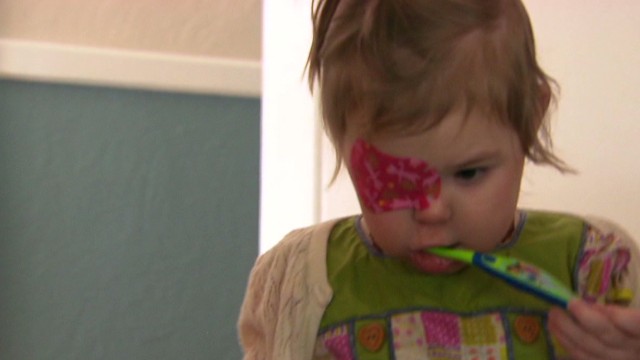Story highlights
- More than 100 families have moved to Colorado for medical marijuana, group says
- A strain known as Charlotte's Web has reduced seizures in many children, parents say
- "If I had stayed home, I would just be watching her die," one mother says
- Some families say they'd return home if their states pass medical marijuana laws
They've come from as far away as Australia and Canada, or as close as Oklahoma.
They are of different backgrounds and ages, but they've all moved to Colorado for the same thing: medical marijuana to treat their sick children.
"Jordan had her first seizure at 6 months old. I had never seen a seizure before," says her mother, Paula Lyles. "We took her to the hospital. The doctors said that would probably be the only one she'd have and sent us home."
But when Jordan was 18 months old, the seizures began in earnest.
But she didn't receive a diagnosis until she was nearly 11. It was Dravet syndrome, a severe form of epilepsy characterized by uncontrolled, continuous seizures. Jordan was put on a combination of three anti-seizure medications.
But "the drugs take her personality away. The side effects of the cure are horrible," Lyles says. Jordan started having "drop seizures" -- which caused her muscles to go limp. The medications took her speech away for two weeks, along with her ability to eat.
"I would rather have her lost to a seizure than watch her stolen away by the side effects of the medicine," Lyles says.
She'd heard about the healing properties of cannabis, but Lyles lived in Ohio, where medical marijuana is not legal.
Even in the 20 states and the District of Columbia where medical marijuana is legal, the federal government classifies cannabis is a Schedule I drug, meaning it has no accepted medical value and a high potential for abuse. Others in that category: heroin, LSD and ecstasy.
So six months ago, after talking to doctors and reading studies on medical marijuana, Lyles packed up her daughter and moved to Colorado, leaving her engineer husband and 25-year-old daughter Lindsay behind.
Doing so allowed Jordan to be treated with a strain of medical marijuana that's high in cannabidiol, or CBD, a chemical in cannabis thought to have medicinal properties, and low in tetrahydrocannabinol, or THC, the psychoactive chemical in pot that gets users high.
Over the last eight months, more than 100 families have moved to Colorado looking for medicine to save their children's lives, according to the Realm of Caring. The organization is run by the Stanley family -- medical marijuana growers and dispensary owners who pioneered a strain of cannabis high in CBD and low in THC.
The strain is called Charlotte's Web. It's named after 7-year-old Charlotte Figi of Colorado Springs. Charlotte also has Dravet syndrome; after being on seven medications with no success, she began taking marijuana in an oil form. Her seizures were drastically reduced -- from 300 a week to two or three a month.
"I'm 52 years old," Lyles says. "My whole life is in Ohio, my family, my friends, my church, my doctors. ... I had a twinge in my heart because I knew it was the right thing to do, but my other voice is saying, 'Hey, this is crazy -- you're going to leave this all behind, break up your family and go?' "
In the end, it's exactly what she did. She says it's been hard on her husband and daughter. But Jordan is much happier, and the results, she says, are undeniable.
"We've been able to reduce her pharmaceuticals by 50% as a result of using Charlotte's Web," Lyles says. "It's ridiculous. I didn't want to do it, but now that I'm out here on the other side I know I'm where I'm supposed to be. I wanted to do anything to save Jordan's life.
"Nobody should be forced with that choice," she says. "... Now I have hope. There was no hope if I had stayed home. I would just be watching her die."
About 3 million people in the United States have epilepsy, according to the American Epilepsy Society. Of those, a third have treatment-resistant seizures.
The society supports clinical studies on the effectiveness of cannabis for the treatment of epilepsy.
"We desperately need new treatments, and we need more research to get those treatments," says Dr. Amy Brooks-Kayal, vice president of the group.
"There are anecdotal reports in some people with epilepsy where marijuana derivatives seem to be effective. There are other cases where it seems not to have worked as well, and what we need to understand is who might benefit from marijuana and marijuana derivatives such as cannabidiol, how much we would give them, how often to give it (and) what the potential side effects might be."
One parent who knows about side effects is Nicole, 35, who prefers not to use her last name. She and her husband moved to Colorado from Minnesota nearly four years ago when his job transferred him.
Their son was diagnosed with Dravet syndrome just before turning 3. He'd had seizures since he was 11 months old. He would have between 50 and 90 grand mal seizures in a 48-hour period.
"He's tried several diets, supplements -- pretty much you name it, we've tried it," Nicole says. "He's even tried the medication that's used in dogs to treat epilepsy, triple bromide. It didn't work."
But neither did marijuana. Three times over the course of a year they tried CBD and THCa, a strain of non-psychoactive medical marijuana.
"It never helped his big seizures. In fact, they kept getting worse," Nicole says. "They were getting worse before we started cannabis, but cannabis did not help them."
Since they stopped the cannabis more than a year ago, Nicole says her son is doing much better. However, she still supports cannabis as a treatment option.
"I've seen firsthand what this has done for other kids, and just because this doesn't work for my son doesn't mean that I'm against it," she says. "Knowing what I know now, I would still try it."
But Butch and Mandy Swann of Haleyville, Alabama, know it works for their daughter Allie. Now 14, Allie was 6 months old when she had her first seizure. She was diagnosed early with intractable seizures. She's had two surgeries, including one to remove her right frontal lobe at age 6 after neurologists found a spot there they determined the seizures began.
"She was having 200, 300 seizures a day at the age of 6," Butch Swann says. "After the surgeries, she probably went down to 50 (to) 100."
Allie "had been on every medication available," he says. "... She was on like 20. Sometimes it would help the seizures, but it would have such bad side effects."
She was sick all the time. Then in August, Swann's sister told him about a CNN report on medical marijuana and epilepsy.
"I watched it, and it was like a light bulb flipped on in my head and just something inside me said, 'You've got to go try this.' "
A month later, Swann moved his family to Colorado Springs.
"It was very trying for the family," he says. "We wanted to get Allie help, but we didn't want to have to leave our families to do that. But we just had to. We couldn't not try the medication.
"I told my wife, 'Let's go try it. If it works, great. If it doesn't, we'll come home.' And we packed up everything we had and moved, everything we could fit in the truck.
"... We knew that there was a wait list for the medication and the more people that saw that documentary they were going to get ahead of us if we didn't get out here. We didn't have any time to waste. We had to come."
Dr. Edward Maa, chief of Denver Health's Comprehensive Epilepsy Program, discovered one-third of his patients were using medical marijuana without his knowledge.
"I was shocked at how many people were actually using it," the neurologist says.
Although concerned about its long-term safety, he immediately became more interested in cannabis as a potential treatment. He says he's shocked at the number of families that move to Colorado -- just to get this medicine for their children.
"They can't take it back home, and it's actually split up families," Maa says. "This conflict is really driving families apart. It's crazy. It's absolutely crazy."
If it's proven to be effective, Maa says he believes marijuana should be available.
"At least an exception for a compound like this -- or similar compounds with high CBD content, and not so much of the THC. ... The psychoactivity, I think is really reduced in this oil, in this product. I don't see what the problem is. The fact that it's Schedule I is arbitrary at this point. And I think it should be relaxed, at least in a medical, sort of compassionate-use basis."
Tara and Ron Rodriguez say they split up their family to save the lives of two of their five children.
In November, Tara and her mother left Arizona for Colorado with Ronnie, 17; Cienna, 6; and Cedric, 21. Ronnie and Cienna were both diagnosed as toddlers with intractable epilepsy. Cedric left school, where he was studying nursing, to help his mother care for his two siblings.
Ron, a registered nurse, was working and in school. Savannah, 15, stayed behind, as did the couple's oldest son, Steven, who has three children of his own.
Since 2, Ronnie, who also has autism, has been on eight different types of anti-seizure medications.
"From being comatose from so many medications and so many seizures, he functions now as a first-grader, roughly a 5- or 6-year-old," his mother says of the teen. "He needs total care."
Cienna suffered her first seizure at 8 months old. At 18 months, the seizures came with a vengeance and never left. They are multiple types of seizures, no less than a 200 a month.
Both children are doing better now, with their medicine cut in half, the seizures drastically reduced -- but at a cost.
"It's the hardest thing that I've ever had to do in my life," Tara Rodriguez says. "The separation and the distance ... I just get through the day the best that I can, knowing what I'm doing to give my children the best quality of life."
Last month, she moved to California with Ronnie and Cienna. They still have access to medical marijuana, and it's closer to Arizona -- Ron makes the five-hour trip on weekends to spend time with his wife and children. Cedric has gone back to nursing school.
"I have been waiting for 15 years for an answer," Tara Rodriguez says. "This has been an incredible journey, and I have no regrets."
She says if Charlotte's Web becomes available in Arizona, she would go back home. "That will be the answer to our prayers, for us to be reunited again."
Cristi and Francis Bundukamara were living in Miami when their two youngest children were diagnosed with a rare and fatal degenerative disease called DRPLA, or dentatorubral-pallidoluysian atrophy.
Reggie, now 14, began having seizures when he was 7 and is severely affected, experiencing 25 to 100 grand mal seizures a month. On a bad day, he'd have hundreds of smaller seizures.
Genetic testing reveals the disease so the whole family was tested. That led to Miah's diagnosis at 8 (she's now 13).
Francis, a teacher in Miami-Dade public schools, and Cristi, a nurse practitioner and professor at Miami Dade College, decided to move their family to Colorado.
"You basically have two choices -- you try to do it illegally, or you uproot your family, so that's what we did," Cristi Bundukamara says. "This was our only hope. We almost lost Reggie a couple of times in the last two years. ..."
Reggie and Miah are on Charlotte's Web, and their medications have been drastically reduced. Last month, Reggie was down to 13 grand mal seizures, and he's eating and communicating again.
Cristi Bundukamara is no longer sure she'd go home even if Florida passed medical marijuana laws.
"It was so hard to uproot and leave, and we're just getting settled," she says. "But it still feels like home. Florida still feels like home."











